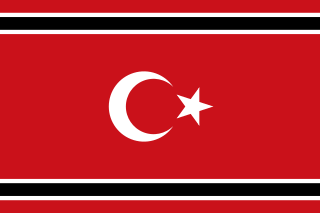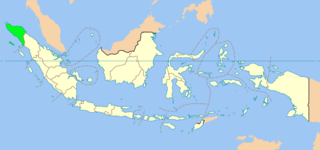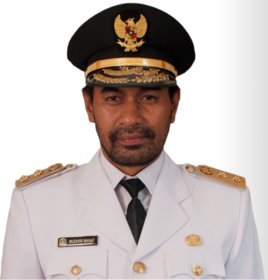Related Research Articles

Aceh, officially the Province of Aceh, is the westernmost province of Indonesia. It is located on the northern end of Sumatra island, with Banda Aceh being its capital and largest city. It is bordered by the Indian Ocean to the west, Strait of Malacca to the northeast, as well bordering the province of North Sumatra to the east, and shares maritime borders with Malaysia and Thailand to the east, Maldives, British Indian Ocean Territory of the United Kingdom, Sri Lanka to the west, Andaman and Nicobar Islands of India and Myanmar to the north. Granted a special autonomous status, Aceh is a religiously conservative territory and the only Indonesian province practicing the Sharia law officially. There are ten indigenous ethnic groups in this region, the largest being the Acehnese people, accounting for approximately 70% of the region's population.

The Free Aceh Movement was a separatist group seeking independence for the Aceh region of Sumatra, Indonesia. GAM fought against Indonesian government forces in the Aceh insurgency from 1976 to 2005, during which over 15,000 lives are believed to have been lost.

Hasan Muhammad di Tiro, was the founder of the Free Aceh Movement (GAM), an organisation which attempted to separate Aceh from Indonesia from the 1970s. It surrendered its separatist goals and agreed to disarm as agreed to in the Helsinki peace deal of 2005. He was the maternal great-grandson of Tengku Cik di Tiro, an Indonesian national hero who was killed fighting the Dutch in 1891. In 2010 he obtained his Indonesian citizenship back shortly before his death.

Persatuan Sepakbola Indonesia Kutaraja, commonly known as Persiraja, is an Indonesian professional football club based in Banda Aceh, Aceh. They currently compete in the Liga 2. They play their home matches either at Harapan Bangsa Stadium or H. Dimurthala Stadium. Their most memorable achievements is when they became champion of Perserikatan in 1980.

Terrorism in Indonesia refer to acts of terrorism that take place within Indonesia or attacks on Indonesian people or interests abroad. These acts of terrorism often target the government of Indonesia or foreigners in Indonesia, most notably Western visitors, especially those from the United States and Australia.

The 2003–2004 Indonesian offensive in Aceh against the Free Aceh Movement (GAM) separatists was launched on May 19, 2003, and lasted nearly one year. It followed a two-week ultimatum to GAM to accept special autonomy under Indonesian rule. It was one of the Indonesian military's largest campaigns since the 1975 invasion of East Timor. It severely disabled the rebel movement, and along with the 2004 Indian Ocean earthquake brought the 30-year conflict in Aceh to an end.

The insurgency in Aceh, officially designated the Rebellion in Aceh by the Indonesian government, was a conflict fought by the Free Aceh Movement (GAM) between 1976 and 2005, with the goal of making the province of Aceh independent from Indonesia. The aftermath of a strong military offensive in 2003 and the 2004 Indian Ocean earthquake brought a peace agreement and an end to the insurgency.

The Aceh Party is a regional political party in Indonesia. It contested the 2009 elections in the province of Aceh, and is the largest party in the Aceh provincial legislature.

Zaini Abdullah is an Indonesian politician and former separatist activist of the Free Aceh Movement in Indonesia who was elected as the governor of the province of Aceh in the 2012 election for a five-year period from 2012 to 2017. Elected with 56% of the vote, Zaini Abdullah is the second governor directly chosen by the electors of Aceh since the granting of restricted autonomy to the area by the Indonesian government in 2005. His predecessor Irwandi Yusuf, who was elected in 2006 for the period from 2007 to 2012, was the first governor chosen in the province by direct elections.

The 1990–1998 Indonesian military operations in Aceh, also known as Operation Red Net or Military Operation Area was launched in early 1990 until 22 August 1998, against the separatist movement of Free Aceh Movement (GAM) in Aceh. During that period, the Indonesian army practiced large-scale and systematic human rights abuses against the Acehnese. The war was characterised as a "dirty war" involving arbitrary executions, kidnapping, torture, mass rape, disappearances, and the torching of villages. Amnesty International called the military operations response as a "shock therapy" for GAM. Villages that were suspected of harboring GAM operatives were burnt down and family members of suspected militants were kidnapped and tortured. Between 9,000 and 12,000 people, mostly civilians, were killed between 1989 and 1998 in the operation.
Juha Christensen is a Finnish businessman, philanthropist and negotiator who played an instrumental role in the 2005 Aceh peace process.

Iskandar Muda Military Region Command is a military territorial command of the Indonesian Army. It has been in active service as the local division for Aceh Province. Its emblem is a white elephant, after the war elephants that served in the namesake's army during his rule as Sultan of Aceh.

Tubagus Hasanuddin or known as TB Hasanuddin is an Indonesian politician and former Indonesian military officer who has served as a member of the People's Representative Council of the PDI-P Faction between 2009 and 2018, and from 2019 to present.

Effendi Muara Sakti Simbolon is an Indonesian politician of PDI-P who has been a member of the People's Representative Council (DPR) since 2004. Despite coming from the same political party, Simbolon was a noted critic of president Joko Widodo, especially in Widodo's first years as president.

Muzakir Manaf, popularly known as Mualem, is an Indonesian politician and former Free Aceh Movement (GAM) guerilla fighter who served as the vice governor of Aceh between 2012 and 2017. Leading the movement's guerilla wing following the death of his predecessor, he was its leader at the end of the conflict and later founded the Aceh Party, becoming its first and current chairman.

Operation Cartenz's Peace, formerly Operation Nemangkawi, is a joint-operation conducted by Indonesian National Armed Forces and Indonesian National Police to curb armed separatist rebels in Papua. According to Papua Regional Police head, Mathius Fakhiri, there are currently six active separatist groups located mainly in Papua highlands. While there are two groups which became less active or retired after Operation Nemangkawi. Tinggi Nambut faction under Goliath Tabuni were beaten in October 2018, and 10 members were subdued by Police. Goliath Tabuni moved to Gome District and presumed retired. Lanny Jaya faction under Purom Wenda became less active after Police operation in Balingga District and its headquarters in Kali Mau. Some members of this group left and "return" to Indonesia.
References
- ↑ "Siapa Sebenarnya Din Minimi yang Menyerahkan Diri Kepada BIN?". Bangka Pos (in Indonesian). 29 December 2015. Retrieved 18 November 2018.
- 1 2 3 4 5 6 7 8 9 10 11 "DIN MINIMI: THE STRANGE STORY OF AN ARMED GROUP IN ACEH, INDONESIA" (PDF). Institute for Policy Analysis of Conflict. 15 October 2015. Retrieved 18 November 2018.
- ↑ "Istri Minta Din Minimi Pulang". Serambi Indonesia (in Indonesian). 29 May 2015. Retrieved 18 November 2018.
- ↑ Firdaus, Fahmi (25 March 2015). "Mengenal Din Minimi, Mantan Kombatan GAM Buronan Polisi". Okezone (in Indonesian). Retrieved 18 November 2018.
- ↑ "Din Minimi, Sosok Pekerja yang Ulet". Serambi Indonesia (in Indonesian). 4 June 2015. Retrieved 18 November 2018.
- ↑ Nur Rochmi, Muhammad (30 December 2015). "Siapakah Din Minimi?". beritagar.id (in Indonesian). Archived from the original on 19 November 2018. Retrieved 18 November 2018.
- ↑ "Indonesia: Kidnapped Briton Malcolm Primrose reunited with family". BBC. 13 June 2013. Retrieved 18 November 2018.
- 1 2 Prasetya, Eko (24 March 2015). "Mengerikan, kelompok Din Minimi di Aceh bawa AK-47". Merdeka (in Indonesian). Retrieved 18 November 2018.
- ↑ Simanjuntak, Hotli (8 January 2016). "Aceh's most-wanted criminal ineligible for amnesty, say expert". The Jakarta Post. Retrieved 18 November 2018.
- ↑ "Din Minimi Urusan Polri/TNI". Serambi Indonesia (in Indonesian). 14 October 2014. Retrieved 18 November 2018.
- ↑ "Din Minimi Membantah Anggotanya Terlibat Pembunuhan Anggota TNI". benarnews.org (in Indonesian). 16 April 2015. Retrieved 18 November 2018.
- ↑ Firdaus, Helmi (24 March 2015). "Dua Serdadu TNI Tewas di Aceh Dimakamkan secara Militer". CNN Indonesia (in Indonesian). Retrieved 18 November 2018.
- ↑ Prasetya, Eko (24 March 2015). "Ini Din Minimi, penjahat paling dicari yang buat 2 TNI terbunuh". Merdeka (in Indonesian). Retrieved 18 November 2018.
- ↑ Mardira, Salman (21 May 2015). "Kronologi Kontak Senjata Aparat dengan Kelompok Din Minimi". Okezone (in Indonesian). Retrieved 18 November 2018.
- ↑ "Baku Tembak dengan Kelompok Din Minimi, Senjata dan Ribuan Amunisi Disita". KOMPAS (in Indonesian). 27 May 2015. Retrieved 18 November 2018.
- ↑ Fernandes, Feri (20 August 2015). "Baku Tembak dengan Polisi di Aceh, 1 Anggota Din Minimi Tewas". detikNews (in Indonesian). Retrieved 18 November 2018.
- ↑ "Kapolri: Toleransi Perekat Bangsa". Analisa Daily (in Indonesian). 30 October 2015. Archived from the original on 9 December 2018. Retrieved 18 November 2018.
- ↑ "Danrem Siap Jemput Din Minimi". Serambi Indonesia (in Indonesian). 3 June 2015. Retrieved 18 November 2018.
- ↑ "Pangdam Berdialog Dengan Din Minimi". Serambi Indonesia (in Indonesian). 3 June 2015. Retrieved 18 November 2018.
- ↑ Utama, Abraham (31 December 2015). "Kisah Negosiator Finlandia Penghubung Kepala BIN-Din Minimi". CNN Indonesia (in Indonesian). Retrieved 18 November 2018.
- ↑ Masriadi (2 January 2016). "Din Minimi Sempat Bicara dengan Jokowi Soal Amnesti". KOMPAS (in Indonesian). Retrieved 18 November 2018.
- ↑ Taufiqqurahman, Muhammad (29 December 2015). "Din Minimi Menyerah, Kepala BIN: Mereka Minta KPK Awasi Pemerintah Daerah Aceh". detikNews (in Indonesian). Retrieved 18 November 2018.
- ↑ Siswanto (15 February 2016). "Pro Kontra Amnesti Buat Din Minimi di Komisi I DPR". Suara.com (in Indonesian). Retrieved 18 November 2018.
- ↑ Prasetya, Eko (8 January 2016). "Amnesti Din Minimi Kapolri menolak, Panglima TNI ikut Jokowi". Merdeka (in Indonesian). Retrieved 18 November 2018.
- ↑ Armenia, Resty (5 January 2016). "Jokowi Jamin Berikan Din Minimi Amnesti". CNN Indonesia (in Indonesian). Retrieved 18 November 2018.
- ↑ "Amnesti Din Minimi Harus Didahului Proses Hukum". Serambi Indonesia (in Indonesian). 22 July 2016. Retrieved 18 November 2018.
- ↑ "70 Anggota Din Minimi Terima Amnesti". Republika (in Indonesian). 21 July 2016. Retrieved 18 November 2018.
- ↑ "Din Minimi, Angkat Senjata Hingga Turun Gunung, tapi Begini Nasibnya Sekarang". Serambi Indonesia (in Indonesian). 19 March 2018. Retrieved 18 November 2018.
- ↑ "DIN MINIMI BERGABUNG DENGAN PEMUDA PANCASILA" (in Indonesian). Office of National Unity and Politics of Aceh. Retrieved 18 November 2018.
- ↑ "Din Minimi Dipukul Orang yang Pernah Diculiknya". Serambi Indonesia (in Indonesian). 27 April 2016. Retrieved 18 November 2018.
- ↑ Haryanto, Andry (5 July 2018). "Din Minimi Dukung KPK Sapu Bersih Koruptor di Aceh". liputan6.com (in Indonesian). Retrieved 18 November 2018.
- ↑ Wibowo, Eko Ari (27 September 2020). "Putra Mantan Pimpinan Kelompok Bersenjata Aceh Din Minimi Lolos Prajurit TNI". Tempo. Retrieved 26 October 2022.